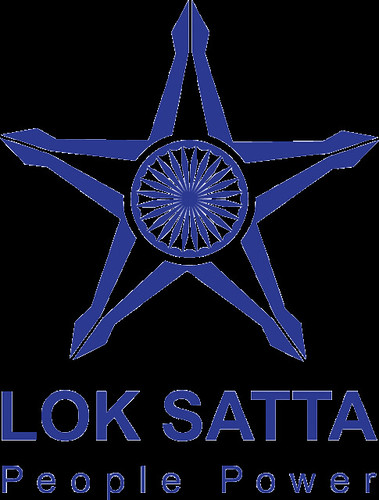Redefining Politics
As part of the Praja Rajyam program to create a new political culture, Lok Satta teams toured six districts of Srikakulam, Vishakapatnam, Vizianagaram, Mahboobnagar, Nalagonda and Guntur in the month of February. In all, nearly 40 public meetings, roadshows, and intellectual symposiums were held in the districts.
Praja Rajyam is a campaign by Lok Satta to infuse new blood into old politics. The focus of the Praja Rajyam program lies on motivating and educating youth, involving them in politics, getting them to participate and through them creating a new political culture. Panchayati Raj training programs are being conducted to train 10,000-15,000 young men and women.
This program has elicited extremely positive responses from the youth everywhere. Apart from
redefining the very nature of politics from one for private good to one for public gain, the Praja Rajyam program also focuses on four other important constituents of Lok Satta’s message:-
1) Education- Every child irrespective of her caste, class or social status, must enjoy the opportunity for vertical mobility. Quality education and accessibility is a fundamental human right which cannot be denied or ignored.
2) Healthcare- Reasonable quality healthcare must be available to all citizens at zero cost. No person or family must suffer or be denied healthcare due to economic inability.
3) Skill Promotion for employment - Many youngsters today are unemployable for want of
skills for productive work. Each youngster in working age must be given the skills to play a rightful role in wealth creation.
4) Rural Incomes- Market vagaries and low productivity are depressing rural incomes. Fair
and democratically managed markets, autonomous co-operatives, post-harvest infrastructure and value addition through processing are the keys to rural prosperity.
Lok Satta believes that politics is a noble endeavor and one that impacts all spheres of life. Even Mahatma Gandhi when questioned on his involvement in politics said, “If I seem to take part in politics it is only because politics encircles us today like the coil of a snake from which one cannot get out, no matter how much one tries. I wish to therefore wrestle with this snake.”
Our founding fathers gave us a noble Constitution which guaranteed universal adult franchise and fundamental rights to all from the beginning. Contrast this with the first written constitution in the world’s oldest democracy, the US, which ignored the slave trade and denied women’s rights. It needed a civil war, 70 years later, with enormous bloodshed to liberate the blacks, and a prolonged struggle to give woman the right to vote in 1920’s, 140 years later. But
our people have been robbed of their republic and the need now is for a new political culture to reclaim this lost republic for the people.
Praja Rajyam is a campaign by Lok Satta to infuse new blood into old politics. The focus of the Praja Rajyam program lies on motivating and educating youth, involving them in politics, getting them to participate and through them creating a new political culture. Panchayati Raj training programs are being conducted to train 10,000-15,000 young men and women.
This program has elicited extremely positive responses from the youth everywhere. Apart from
redefining the very nature of politics from one for private good to one for public gain, the Praja Rajyam program also focuses on four other important constituents of Lok Satta’s message:-
1) Education- Every child irrespective of her caste, class or social status, must enjoy the opportunity for vertical mobility. Quality education and accessibility is a fundamental human right which cannot be denied or ignored.
2) Healthcare- Reasonable quality healthcare must be available to all citizens at zero cost. No person or family must suffer or be denied healthcare due to economic inability.
3) Skill Promotion for employment - Many youngsters today are unemployable for want of
skills for productive work. Each youngster in working age must be given the skills to play a rightful role in wealth creation.
4) Rural Incomes- Market vagaries and low productivity are depressing rural incomes. Fair
and democratically managed markets, autonomous co-operatives, post-harvest infrastructure and value addition through processing are the keys to rural prosperity.
Lok Satta believes that politics is a noble endeavor and one that impacts all spheres of life. Even Mahatma Gandhi when questioned on his involvement in politics said, “If I seem to take part in politics it is only because politics encircles us today like the coil of a snake from which one cannot get out, no matter how much one tries. I wish to therefore wrestle with this snake.”
Our founding fathers gave us a noble Constitution which guaranteed universal adult franchise and fundamental rights to all from the beginning. Contrast this with the first written constitution in the world’s oldest democracy, the US, which ignored the slave trade and denied women’s rights. It needed a civil war, 70 years later, with enormous bloodshed to liberate the blacks, and a prolonged struggle to give woman the right to vote in 1920’s, 140 years later. But
our people have been robbed of their republic and the need now is for a new political culture to reclaim this lost republic for the people.

